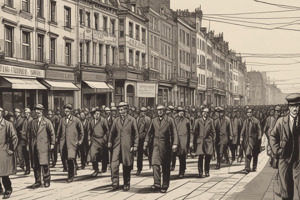Podcast
Questions and Answers
Which Eastern European nations adopted similar socialist models based on centralized planning after the Bolshevik Revolution?
Which Eastern European nations adopted similar socialist models based on centralized planning after the Bolshevik Revolution?
Czechoslovakia, Hungary, Poland, East Germany, Romania, Bulgaria, and Yugoslavia
What country was the first self-proclaimed 'socialist' country in the world?
What country was the first self-proclaimed 'socialist' country in the world?
Soviet Union
What were some of the economic challenges faced by the USSR that led to its collapse?
What were some of the economic challenges faced by the USSR that led to its collapse?
Inability to compete economically with capitalist countries like America and maintaining control of information
How has socialism evolved beyond its original conception in modern times?
How has socialism evolved beyond its original conception in modern times?
What are some of the key principles that socialism was rooted in at its humble beginnings?
What are some of the key principles that socialism was rooted in at its humble beginnings?
What are some Enlightenment ideas that socialism is rooted in?
What are some Enlightenment ideas that socialism is rooted in?
How does socialism differ from capitalism in terms of ownership?
How does socialism differ from capitalism in terms of ownership?
What was a key driving belief behind the rise of early socialist movements?
What was a key driving belief behind the rise of early socialist movements?
Why did many early socialist supporters see the church and state as oppressive?
Why did many early socialist supporters see the church and state as oppressive?
Who was one of the most influential thinkers associated with the development of modern socialism?
Who was one of the most influential thinkers associated with the development of modern socialism?
Flashcards are hidden until you start studying
Study Notes
Socialism in Europe and Russian Revolution
The concept of socialism has played a significant role in European politics since the late 18th century. It is essentially a political philosophy with roots in Enlightenment ideas such as democracy, equality, liberty, fraternity, peace, and justice. As a system, it advocates collective ownership of the means of production, distribution, and exchange, typically through some form of co-operative organisation. This contrasts sharply with capitalism, which allows private individuals to own property and businesses, profit from their labor, and invest these profits into further business ventures, creating a cycle of wealth accumulation among those who can take advantage of opportunities.
Early History
The rise of early socialist movements was largely due to the growing belief that all people were born equal, meaning each had the right to equal access to education, healthcare, and other services. Accordingly, the notion of communal living became popular within certain intellectual circles; this idea would eventually evolve into what we now know as socialism. In addition, many supporters saw the church and the state as oppressive institutions, leading to calls for societies free of religious dogma and government interference.
Marxism
One of the most influential thinkers associated with the development of modern socialism was Karl Marx. He argued that class struggle between bourgeoisie and proletariat inevitably leads to revolution, after which society would move towards true equality under a dictatorship of the proletariat. However, his theories have been highly debated over time, particularly regarding how much power any ruling party might be allowed before becoming a new class of rulers itself.
Soviet Union, Russia, and Eastern Bloc Nations
Following the Bolshevik Revolution of 1917, Lenin established the first self-proclaimed 'socialist' country in the world - the Soviet Union - where collectivization and industrialization were used to transform peasant farmers into workers, producing goods for local consumption rather than export. Despite its initial successes, the USSR ultimately collapsed because it could not compete economically with capitalist countries like America while also maintaining control of information. In response, various eastern European nations adopted similar models based around centralized planning, including Czechoslovakia, Hungary, Poland, East Germany, Romania, Bulgaria, and Yugoslavia, although they varied widely in the degree to which planned economies were implemented.
Modern Usage
Today, socialism has evolved significantly beyond its original conception. For instance, democratic socialists believe that government intervention in economic affairs can improve fairness and equality without suppressing freedom, whereas anarcho-syndicalists support worker cooperatives, rejecting both traditional governments and the wage system. These latter groups represent only one side of the spectrum though; others argue against government involvement altogether. Indeed, current forms range from fully centrally controlled economies, down to total laissez faire market-based systems.
In conclusion, the history of socialism shows us how complex this philosophy actually is. From its humble beginnings rooted in liberty, equality, solidarity, and human dignity, it has grown into numerous forms depending upon specific cultural contexts. Its past has seen immense change, and today there remain numerous arguments for varying levels of government involvement and market regulation.
Studying That Suits You
Use AI to generate personalized quizzes and flashcards to suit your learning preferences.




